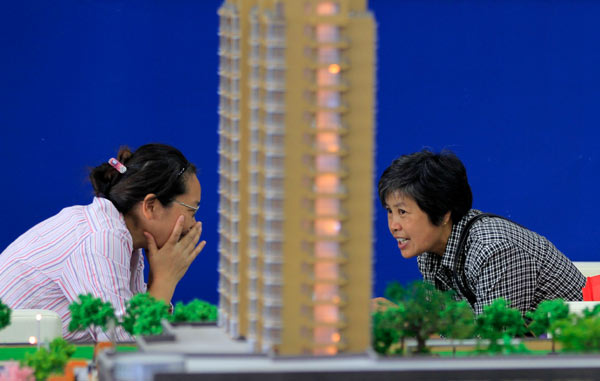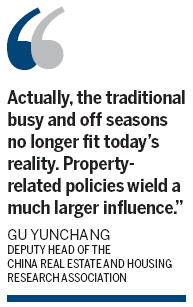Peak season, weak sales
Updated: 2012-10-04 07:57
By Zheng Yangpeng (China Daily)
|
||||||||
Sales decline
The turnover statistics released so far seem to confirm the predictions of developers and industry experts.
Centaline Property Beijing, a real estate brokerage, reported that in the first two weeks of September, 119,581 deals in 54 cities were recorded online, a decline of 11.6 percent compared with the same period in August.
In fact, house sales had shown signs of weakening in August, with 262,416 units sold in the 54 cities monitored by Centaline. Sales declined by 5.7 percent from July, the month that saw the highest turnover so far this year.
In Beijing, which saw above-average growth in turnover and prices, the market is cooling at an unexpectedly rapid rate.
Recorded online transactions fell 24 percent in the first two weeks of September from a month earlier, according to data from the local government.
 |
|
Visitors talk beside a building model at a real estate trade fair in Nanjing, Jiangsu province, in September. [Photo by Dong Jinlin / For China Daily] |
During the same period, sales in Shenzhen, Guangdong province, fell 9.6 percent from a month earlier.
Figures from the China Index Academy, the research arm of Soufun, China's largest property website, confirmed that trend. Of the 20 cities monitored by the index, the number of weekly sales in the first half of September dropped by 12 to 13 percent from a month earlier.
He Tian, director of the China Index Academy, said the time lag between purchases and online registration was the reason behind the September decline, and not all the sales made during the period are reflected in the data.
Rising prices are another limiting factor. "Whenever the price of a housing project rises, sales fall. The effect is very straightforward," said He.
Despite the month-on-month decline, September sales have been stronger than a year ago, according to the China Index Academy.
Market hit a wall
China's property market hit a wall last year when the government implemented a house-purchase limit at the municipal level. In Beijing, for example, that meant a family with one house was only allowed to purchase one more residential property after February 2011.
Those hoping to see discounts during the campaign season are likely to be disappointed. Developers and industry experts said there are few opportunities for large-scale price cuts.
 |
"Our market-monitoring system shows that people with 'trade-up' demand are highly likely to make their purchase during these two months. Compared with first-time buyers, they are less price-sensitive," said Wang.
Some developers said they would not lower prices excessively.
"Except for a few cash-strapped developers, I don't think many will give in on price," said Xiang Wei, marketing manager at a property company he declined to identify.
Experts agree that a nationwide price surge is unlikely.
"Because a large inventory still exists in cities such as Tianjin and Wuhan, the upward price pressure will not be high," said He Tian of the China Index Academy.
"But for cities such as Beijing and Shanghai, where there are fewer house available, upward pressure in the next year will be huge, especially for properties in good locations."
However, Hu Jinghui, vice-president of the real estate service company 5i5j Real Estate, said that in the next 12 months, the chances of a price surge in Beijing are low, given that developers bought a large amount of land in 2011.
According to Hu's analysis, the supply of land available for purchase for residential properties was 8.13 million square meters in 2011. Most of that will translate into 80,000 housing units in the second half of this year and first half of 2013.
"Combined with another inventory of 80,000 (bought pre-2011), 160,000 units of housing supply is large enough to satisfy market demand. Therefore, a price surge is unlikely in the coming year," Hu said.











